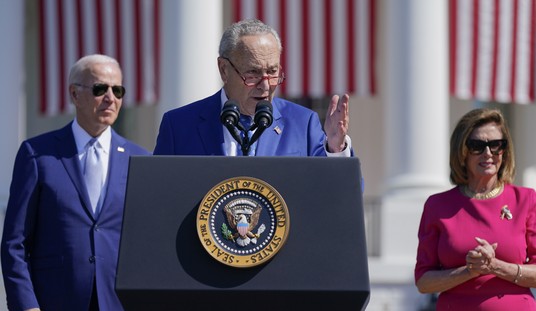As I reported yesterday, DEI Mayor Vi of Charlotte, N.C., praised the city’s “media partners” for not showing the video of the brutal murder of a 23-year-old young woman at the hands of a career criminal on public transit, on the grounds that depicting reality would potentially create awareness of said reality, which the governing authorities find inconvenient. “I want to thank our media partners and community members who have chosen not to repost or share the footage out of respect for Iryna’s family,” stated Vi.
Related: BLMers Launch GoFundMe For Subway Stabber, Charlotte Mayor Urges Video Censorship
Perusing X, I came upon a prescient post from TownHall’s Kurt Schlichter: “Understand that the war on cameras, including surveillance cameras in public spaces, body cams on cops, and your Ring, is coming.”
Understand that the war on cameras, including surveillance cameras in public spaces, body cams on cops, and your Ring, is coming.
— Kurt Schlichter (@KurtSchlichter) September 8, 2025
The problem for the left is they reveal the inconvenient truth, so they have to be banned.
It’s coming, mark my words. pic.twitter.com/cWUcNabp7j
Connecting the dots, Canadian township Hamilton recently ordered one of its residents to take down his security cameras entirely on his own property, citing bylaws.
Via CHCH-TV (emphasis added):
A local Hamilton man has been ordered by the city to take down his security cameras that he has on the outside of his house, despite his claim that his footage has been useful in crime investigations.
Dan Myles says he has 10 security cameras outside his home on MacNab Street North in downtown Hamilton, and he says he needs them.
“Because we had a lot of break and enters into our home and homes around us,” said Myles.
Myles has posted videos of break-ins online.
He also says police have asked him for his videos over the years to help with investigations.
CHCH News reached out to Hamilton police, and they say they can’t confirm the use of Myles’ videos, but said they often work with homeowners, businesses and drivers to get footage…
But last week, Myles received an order to comply with the City of Hamilton’s fortification by-law, which asked him to remove his cameras.
The by-law says homeowners are not permitted to view or listen beyond the perimeters of their own property.
“I got a notice from by-law and I thought ‘how could this be’,” said Myles. “Everybody has Ring doorbells pointed at the street, and my neighbours have cameras pointed at my house, and we all point cameras at each other.”
Related: Denver Councilwoman Floats Whites-Only Business Tax
The authorities in this particular case, according to the report, did not specify the reasons for the takedown order or the purpose of the bylaw. But we can surmise the reason because corporate state media has explicated it.
Via CBC (emphasis added):
The Ring doorbell camera is sold as a great way to monitor who’s at the door, whether you're home or not. But preying on consumers’ fears of having their package deliveries stolen, or worse, is having far-reaching impacts on communities and policing practices around the world.
Director Brett Gaylor meets community activists in Skid Row, Los Angeles, where law enforcement has partnered with Amazon’s Ring, with some unintended consequences. On a map, obtained from the police, the activists notice that ‘hot spots' where police predict crimes will occur is based on users’ ‘reports of suspicision’ are often not found in the heart of Skid Row, but on the outskirts, where gentrifying communities live closest totheir less fortunate, often non-white neighbours. “The map was really a gate,” says Pete White of the StopLAPD Spying Coalition, “(it) wasn’t (for) the protection of people inside Skid Row, it was making sure that the people inside Skid Row were unable to travel outside of its boundaries.”
A neighborhood watch program called “Neighbors,” utilizing Ring footage volunteered by members of the community, assists law enforcement in crime suppression.
However, DEI activists, invoking Trayvon Martin, have denounced the program as racist as they predictably implicate minority groups — predictably, of course, because minorities statistically, as a matter of objective reality, disproportionately commit both property and violent crime.
Via CBS (emphasis added):
In May 2019, the El Monte Police Department in California began a partnership with Ring, the Amazon-owned company best known for its motion sensor video doorbells and home security cameras. Ring cameras can be linked to its crime-sharing social media app called Neighbors. Police Chief David Reynoso explained, "If someone has a Ring camera, they download the software and then they choose to be part of the El Monte Police Department Neighbors Portal, then not only can the police department see it, but every other neighbor who's part of that portal gets to see it also."
The Neighbors Portal is an extension of the Neighbors app that allows police officers to view and comment on public posts as verified law enforcement. Police departments can share information about crime and safety events. They can also ask for help on active investigations by creating a so-called "geofence" around a crime location and requesting video footage captured on home security cameras filmed at specific times…
But for many, the growing popularity of these digitized versions of neighborhood watch programs is cause for alarm.
In 2019, Motherboard individually reviewed more than 100 user-submitted posts in the Neighbors app over two months in the New York City area. They found that the majority of people reported as "suspicious" were people of color. Nextdoor, an app originally meant for communication between neighbors, also had its share of controversies with complaints about racial profiling by some using the app.
"These apps are dangerous because they not only reflect people's biases about marginalized people, but these apps legitimize that bias as an effective guide for addressing crime," wrote Myaisha Hayes, campaign director at Media Justice, a civil rights organization focused on equity in the digital age.
Hayes warns these apps are digitizing the same type of racial profiling associated with traditional neighborhood watch programs. "We know, given the murder of Trayvon Martin, that this bias can have life-threatening consequences for Black and brown people who may be passing through your neighborhood," she wrote in a statement to CBS News.
So, if you live in a blue city, you might soon wave goodbye to your personal security systems and submit to the criminals or incur the wrath of the state.









